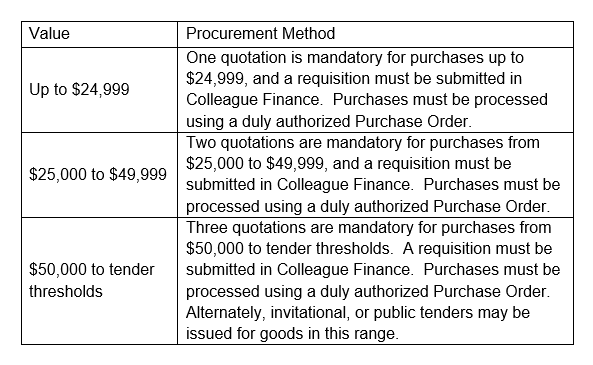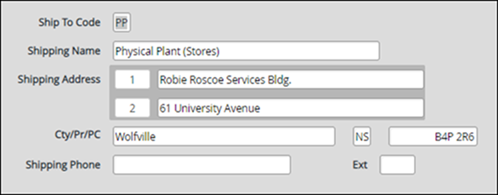Procurement Services
Procurement Services assists with the sourcing of goods and services, providing best value though open, fair, and transparent procurement processes, while ensuring compliance with University policies and procedures, Government policies, regulations, and trade agreements.
See below for further information on the services provided.
Services for Faculty and Staff
- Purchasing Cards (P-Cards)
- Purchase Orders
- Local Field Orders
- Supply Agreements
- Tendering and Requests for Proposals
- Procurement using CFI Grant funds
- Procurement Training (Policy and Procedures, Requisitions and Purchase Orders)
- Customs
- Receipt of Goods and Services
- Return of Goods
- Surplus Materials - TBD
Purchasing Methods
The nature and value of the purchasing requirement will determine how the goods and services will be purchases. Purchasing Methods include:
Quotes and Procurement Thresholds
The procurement thresholds outlined below apply for the use of purchase orders to obtain goods, services, and construction:

Unauthorized Purchase Methods
The University is not responsible for goods or services delivered without an authorized purchase request (P-Card or Purchase Order). Purchase Orders will only be issued before the goods are received or the services are rendered.
Emergency Orders
Emergency orders may occur on rare occasions, and are to be handled by Procurement Services.
Alternative Procurement Practices (ALTP)
The University endeavors to provide a competitive process according to the established dollar value thresholds. To balance the need to be open, equitable, and competitive with the demands of urgent, specialized, or exceptional circumstances, alternative procurement practices are used under specific justifications. See the Alternative Procurement Practices (ALTP) Procedures and ALTP Justification Form for further information. Any questions should be directed to Procurement Services.
Purchase Order Exceptions
There are certain goods and services for which a Purchase Order may not be acceptable or appropriate. Such items may be procured through alternative means such as cheque requisitions, or expense reports. The University Procurement Policy must be followed for all purchases. Please direct all questions to Procurement Services. A list of exceptions can be found here.
Purchase Order Terms and Conditions
The Purchase Order Terms and Conditions can be found in the Quick Links section on this page.
Purchasing Goods and Services, and Privacy and Information Security Assessments
Acadia University is responsible for ensuring the availability, confidentiality, and integrity of all information to which it is entrusted. University data and information, whether managed and residing on university information technology resources, stored on personal devices, managed by a third party or an operations partner, or outsourced to a service provider, is an important asset that must be governed, protected, and appropriately safeguarded.
A Privacy and Information Security Assessment is required for all Technology Services that require University data and information to be provided.
The following scenarios are examples of activities that would need to follow a Technology Services Assessment:
- Need to share information or collaborate using information technology.
- Need to purchase IT assets, including computers, mobile devices, servers, network‐enabled devices, etc.
- Need to purchase IT services, software, or systems, either locally hosted or cloud based.
Please contact Technology Services to discuss the purchase of Technology Assets prior to their purchase and to start an assessment.
Delivery of Large Shipments
Only Canada Post mail and courier shipments are to be delivered to the Post Office. Large orders or oversized shipments cannot be received at the Post Office. They should be addressed to Physical Plant (Stores). Delivery will need to be coordinated between you, Procurement Services and Physical Plant, in advance of the delivery date. Please enter Physical Plant Ship to Code in the requisition, as shown below:
The requisition should include the appropriate delivery instructions and contact information. Please add the following information in the Printed Comments field of the requisition:
Delivery to Physical Plant (Stores) must be pre-arranged and confirmed by contacting:
Supply Agreements
Acadia is partnered with Interuniversity Services Incorporated (ISI), who coordinates and administers goods and services agreements on behalf of Acadia and other member institutions. Below is a list of current agreements.
- Car Rentals
- Courier - Out of Town
- Customs
- Fuel - Diesel
- Fuel - Furnace
- Fuel - Propane
- Gas Cylinders
- Lab Supplies
- Lamp Supplies
- Mattresses
- MRO - Electrical Supplies
- Multi-Function Devices
- Paper - Fine
- Shredding Services
- Stationery
Contact Procurement Services for further information.
Tendering, Requests for Proposals, and Requests for Quotations
Contact Procurement Services for purchase requirements with an estimated value close to or above:
- Goods: $133,800+
- Services: $133,800+
- Construction:$334,400+
These minimum thresholds are based on the Canadian Free Trade Agreement (CFTA). Tender/RFP/RFQ posting timelines are also determined by the applicable trade agreement.
The University posts all competitive solicitations on or above the thresholds listed on the Government of Nova Scotia Website.
Canada Foundation for Innovation (CFI) Procurement
CFI is an independent corporation established in 1997 by the Government of Canada to fund research infrastructure. The CFI Program and Policy Guide provides details of eligibility requirements and procedures to be followed when applying for a CFI grant and to ensure purchasing and document management is compliant with the CFI guidelines.
CFI Procurement Procedure can be found here.
Contact Procurement Services for further information on how to purchase CFI-funded infrastructure.
Procurement Training
Procurement can offer both standard one-on-one or customized group training sessions on procurement policy and procedures, as well as how to place orders using Colleague Finance. Please contact Procurement Services for further information.
Colleague Requisition Training
Procurement Services provides training on entering and approving requisitions in Colleague Finance. Whether you are a new user or require a refresher, Procurement Services is here to assist you.
Colleague Finance Access
All requisitions are entered and approved in Colleague. To obtain access to Colleague Finance, fill out the Colleague Account Request Form.
Customs
The customs clearance process is handled through Acadia University's appointed Customs Broker.
Inbound Goods
All goods procured from outside Canada must be purchased using a Purchase Order or a University Purchasing Card (P-Card) in order to effectively manage issues of ownership, cross border documentation and importation duties.
Goods being imported into Canada are required to be cleared through Canada Customs. This includes all commercial goods, gifts, biological samples, and samples. Failure to report goods being imported can result in penalties and fines against the University.
Goods are to be shipped with the following documents:
- Manifest of Goods or Packing List.
- Commercial invoice or Canada Customs invoice containing all pertinent information about the shipment*.
- The Canada/US Free Trade Certification (CUSMA/USMCA) signed by the producer or exporter
* The commercial invoice or Canada Customs invoice provided by vendors when shipping the goods must include the following information. Failure to supply this information on the documents may result in the delay of customs clearance and delivery of your shipment:
- Description: Include a complete description of the goods.
- Country of manufacture: Where the goods were produced or sourced.
- Value: The actual shipment value must be provided for Canada Customs purposes. This applies to every shipment including samples for research and teaching. Unsolicited goods, samples, no charge items, etc. are required to be reported to Customs and to have appropriate duty and/or GST paid at the time of import. These goods must be valued as if there were a sale.
- Exporter name and address: Full address information of the exporter is required, including contact information.
- Importer name and address: Shipments should be addressed with Acadia University as the first line of address so as not to delay the customs clearance of your shipment.
- Purchase order or GL/account number: A purchase order number referencing the purchase or GL/account number (only when using a P-Card) is required to appear on the paperwork being sent by the exporter.
- Personal shipments imported into Canada should not be addressed to Acadia University and will not be processed by Procurement Services.
Outbound Goods
Employees wishing to ship University goods outside of Canada for repair, for temporary research purposes, etc. should contact Procurement Services well in advance of shipping the goods. Procurement will consult with our Customs Broker, and additional paperwork may need to be prepared for your shipment.
Receipt of Goods and Services
When a purchase order is issued by Procurement Services, a copy is emailed to both the supplier and the initiator. The initiator should save a copy of the purchase order in an appropriate file until the good or service has been received and the order is ready to be approved for payment.
Receipt of Goods: When the goods are received, the initiator is responsible to:
- Remove any paperwork from the shipping package and attach it to the packing slip.
- Verify the content of the packages to the packing slip and the purchase order and record any discrepancies or damage.
- Attach the packing slip and all supporting documentation (i.e. carrier waybill, etc.) to the purchase order and date and sign for receipt of goods.
- Forward all documentation to Accounts Payable for further processing as soon as the shipment has been received.
The initiator is required to maintain all paperwork related to their shipment and to forward it to Accounts Payable with a copy of the purchase order. Do not discard any paperwork and do not wait for an invoice.
Receipt of Services: When the services are received in full, the initiator is responsible to:
- Verify the receipt of the services on the purchase order.
- Attach any documentation to the purchase order and date and sign for receipt of services.
- Forward all documentation to Accounts Payable for further processing.
Return of Goods
Where goods are received not as ordered, damaged or missing, the department should make a notation on the receiving copy of the purchase order and packing slip/Bill of Lading and bring it to the attention of Procurement Services as soon as possible, as most carriers and vendors have specific time restrictions for filing claims.
Where goods are being returned because they are not suitable, there are several options:
- In the case of stationary supplies, departments can use the online ordering system to initiate a return to the supplier. Once registered online, arrange for pick-up and the goods will be picked up by the driver.
- Where the goods are from another source, the department will be required to contact the supplier to obtain a return authorization. The goods must be re-packed for return. Departments will typically have to cover the freight cost to return the goods, and departments should note that suppliers may charge a re-stocking fee (typically up to 25% of the original cost).
- Where a shipment is received in an obviously damaged condition, the delivery person should be asked to note this information in writing on both copies of the freight receipt, i.e. the copy left with the department and the copy retained. After notifying Procurement Services, the noted freight bill should be forwarded to Procurement. It is necessary that the shipment, including packaging, be retained until the claim has been concluded and Procurement Services advises what to do with the shipment. Depending on how the shipment was arranged, Procurement Services will work with the supplier or the carrier to file a damage claim.
Procurement is responsible for preparing and submitting all the "claims" documents as required. Procurement will confer with the Department to see which items need to be replaced and/or repaired.
In such cases, where the carrier refuses to accept responsibility for the damage because of improper packing by the supplier, Procurement will proceed with a claim directly against the supplier.
The proceeds of claims as received will be credited back to the Department concerned.

